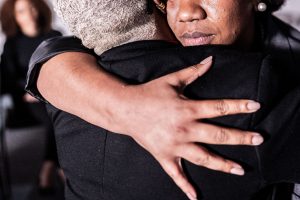I’m Amy. I am powerless over food, and my life is unmanageable when I am using my drug of choice or when I’m not staying plugged into my Higher Power (even if abstinent).
I used to weigh 450 pounds (205 kg). I lost much of it but gained back 60 pounds (27 kg) and have struggled with that gain for a while now. However, I’m grateful to have lost and kept off over 200 pounds (91 kg).
I’m also grateful for the struggle because it’s taught me a lot about powerlessness, humility, and gentleness. When I came back to OA after several years of relapse, I was finally desperate enough to work this program. I’d attended meetings regularly, done lots of service, and participated in lots of fellowship for years—but I neglected to actually work the Twelve Steps.
That desperation was a gift. It made me malleable enough to accept the program. I did what I was told, complaining the whole time, of course: I would say that I wasn’t going to do what my sponsor advised, only to do it a day, week, or month later and see if the program was working for me.
If I’d waited to be “struck abstinent,” I’d be dead and buried in a piano box. I had to do the behaviors that got me to abstinence: go to meetings, get a sponsor, read the Big Book and OA literature, call other members, work the Steps, and follow my plan of eating to the best of my ability.
Though I may not be strong enough today to practice a certain recovery behavior, I can pray for the willingness. If I can take that one action, I’ll be more willing to take another.
If you don’t do it perfectly—well, join the rest of us! Maybe the first time you go off your food plan, you call your sponsor. Then, you work up to calling your sponsor beforehand. Then work up to stopping the thought before you pick up the food. I used perfectionism as an excuse for not doing the next right thing. That kind of thinking has killed many diets and other life plans. Letting go of perfectionism through Step work has really helped me in my journey.
Even if you are six feet tall (183 cm), you can’t climb out of a 100-foot (30 m) pit of despair on your own. That’s why the Fellowship is there to help, and your sponsor will guide you through the Steps. It’s true for me that the lighter I got, the easier it was to climb out, so stick to your plan of eating. Everybody’s recovery journey is different—I know people who can eat foods that I can’t—so don’t judge yours against anyone else’s.
Taking Step One was a sweet release. I no longer have to suffer the pain of pretending I’m a normal eater. Though I may not be strong enough today to practice a certain recovery behavior, I can pray for the willingness. If I can take that one action, I’ll be more willing to take another. OA is not a program of quick fixes. For this ex-perfectionist it’s been a tough road, but I’ve turned stubbornness into perseverance by working the Steps. Doing a Step One inventory of my food history and all that this disease has cost me gave me the willingness to do the work: not think about it, not talk about it, but do it—however imperfectly.





